Acne
Understanding Acne: A Widespread Skin Condition Impacting Millions
Acne is a highly prevalent skin disease that affects people across all age groups, although it is particularly common among adolescents. This condition impacts over 650 million individuals worldwide, making it the most prevalent skin disorder globally. Acne occurs when naturally occurring oils (sebum) and dead skin cells clog hair follicles and pores. These blockages create an ideal environment for bacteria, leading to inflammation and the development of various acne symptoms, including pimples, whiteheads, and blackheads. Acne does not discriminate; it affects men and women of all races and ages.
The Development of Acne: Causes and Mechanisms
- Sebum Production: Sebum is an oily substance produced by sebaceous glands to lubricate the skin and hair. Excessive production can lead to clogged pores.
- Dead Skin Cells: Normally, dead skin cells rise to the surface and are shed. When combined with excess sebum, they can become trapped in hair follicles.
- Bacterial Growth: The clogged follicles provide a breeding ground for bacteria, particularly Propionibacterium acnes (P. acnes), leading to infection and inflammation.
- Inflammatory Response: The body’s immune response to the bacterial infection causes redness, swelling, and the formation of various types of acne lesions, such as pustules, nodules, and cysts.
Who Is Affected by Acne?
While acne is most commonly associated with teenagers due to hormonal changes during puberty, it also affects adults. Hormonal fluctuations, stress, dietary factors, and certain medications can trigger or exacerbate acne in adults. Genetics also play a significant role, meaning that if your parents had acne, you are more likely to develop it as well. Acne can persist into adulthood, affecting people in their 20s, 30s, 40s, and even 50s.
Comprehensive Acne Treatment at The Skin Surgery Center
At The Skin Surgery Center, we prioritize your skin health and understand the significant impact acne can have on your life. Whether you are 13, 23, or 53, struggling with acne can be distressing, but you don’t have to face it alone. Our team of experienced dermatologists offers personalized care tailored to your unique skin needs.
Customized Treatment Plans for Every Age Group
Adolescents: Teenage acne often requires treatments that target excessive oil production and bacterial growth. Our dermatologists may recommend topical treatments, such as benzoyl peroxide, salicylic acid, or retinoids, and oral medications if necessary.
Young Adults: Acne in adults in their 20s and 30s can be influenced by hormonal changes and lifestyle factors. We offer advanced treatments, including hormone therapy, light therapy, and chemical peels, to address persistent acne effectively.
Mature Adults: Treating acne in older adults requires a gentle approach that considers the skin’s aging process. Our dermatologists focus on treatments like retinoids, anti-inflammatory medications, and other advanced options to promote clear skin without irritation.
Examples of Acne
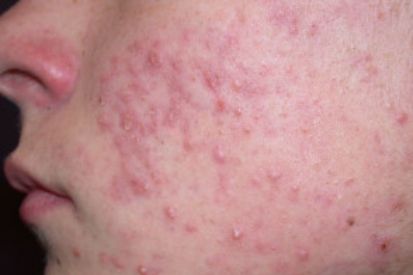
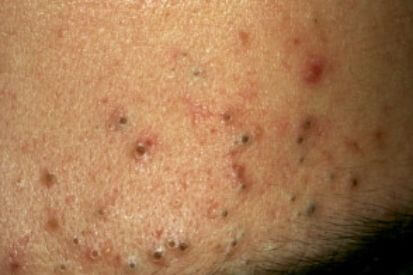
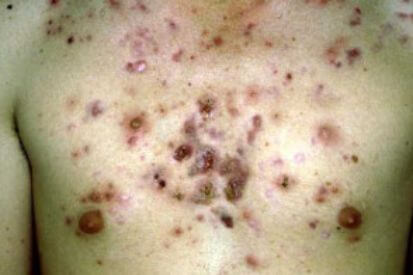
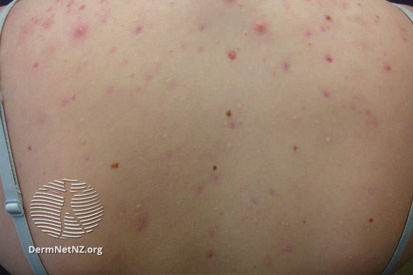
What are the Symptoms of Acne?
Before you can understand how to get rid of acne, it’s important to know the symptoms and how they may appear. Acne can range from mild blemishes to more severe, painful lesions, and it often affects not just the face but other areas of the body as well.
Common acne symptoms include:
- Pimples, blackheads, and whiteheads
- Red, inflamed bumps (papules)
- Pus-filled lesions (pustules)
- Large, firm nodules under the skin
- Painful cysts that may leave scars
- Breakouts on the face, neck, chest, back, shoulders, upper arms, or buttocks
What Causes Acne?
Acne develops when oil, dead skin cells, and bacteria build up in the pores, leading to inflammation and breakouts. Hormonal fluctuations are one of the most common triggers, especially during puberty, menstruation, and pregnancy, when hormone levels can increase oil production. Bacterial infection within clogged pores further aggravates the skin, creating redness, swelling, and sometimes painful lesions.
Other factors can exacerbate acne, including an unhealthy diet, certain medications, and stress. While stress doesn’t directly cause acne, it can trigger flare-ups and slow skin healing. Recognizing these influences is crucial for selecting the appropriate treatment and prevention plan.
- Hormonal Fluctuations: Hormonal changes, especially during puberty, menstruation, and pregnancy, can stimulate acne.
- Bacterial Infection: When hair follicles become clogged with excess oil and dead skin cells, bacteria multiply, triggering inflammation.
- Diet: Some studies suggest that certain foods may influence acne development.
- Medications: Certain medications can contribute to acne development.
- Stress: Stress doesn't directly cause acne, but it can exacerbate existing conditions.
How to Prevent Acne
Preventing acne starts with simple, consistent habits that support healthy skin. By following a daily routine and making mindful lifestyle choices, you can reduce breakouts and maintain clearer skin over time.
Key acne prevention strategies include:
- Cleansing your face twice daily with a gentle, non-comedogenic cleanser
- Moisturizing with an oil-free, non-comedogenic product
- Staying hydrated and maintaining a balanced diet
- Avoiding touching your face to reduce bacterial transfer
- Seeking personalized guidance from a dermatologist for persistent issues
Working with an expert at Pinnacle Dermatology can help you establish a foundation for lifelong skin health and create a routine tailored to your unique skin needs.
Acne FAQs
Over-the-counter acne products typically contain ingredients like benzoyl peroxide, salicylic acid, or alpha hydroxy acids. These products can be effective for mild acne. Prescription treatments, on the other hand, may include stronger formulations of these ingredients or other medications such as topical or oral antibiotics, retinoids, or hormonal therapies. Your dermatologist can assess the severity of the acne and recommend an appropriate treatment plan.
The timeline for acne improvement can vary depending on the severity of the acne, the chosen treatment, and individual factors. Over-the-counter products may show initial results in a few weeks, while prescription medications, such as topical retinoids or oral antibiotics, may take several weeks to a few months. It's important to be patient and consistent with the recommended treatment plan. If there's minimal improvement or worsening of acne, your dermatologist may adjust the treatment.
Acne is a common skin condition that can affect people of all ages, genders, and ethnicities. It is most commonly associated with adolescence due to hormonal changes during puberty, but acne can persist or develop in adults as well.
While acne can be frustrating, it is a treatable condition. Consulting with your dermatologist can help determine the most appropriate treatment plan based on individual skin type and the severity of the acne.
Dermatologists tailor acne treatments based on the individual's skin type and the severity of the condition. Common treatments include topical medications like retinoids and benzoyl peroxide, oral antibiotics, and, in some cases, oral contraceptives or isotretinoin. Light and laser therapies may also be recommended. Results vary, but many patients experience a significant reduction in acne lesions, improved skin texture, and minimized scarring. Consistency with the prescribed treatment plan is key to achieving optimal outcomes.
Dermatologists offer various treatments to address acne scarring, including laser therapy, chemical peels, microneedling, and fillers. While complete removal of scars may not always be possible, significant improvement is often achievable. Dermatologists work with patients to develop customized treatment plans, providing realistic expectations and guiding them through a process that can lead to smoother, more even-toned skin.
Early intervention and consistent follow-up with a dermatologist are crucial for optimizing outcomes in the management of acne and its potential scarring.
From Our QualDerm Family of Providers: Acne Treatment Options
Why Choose The Skin Surgery Center?
Expert Dermatologists: Our board-certified dermatologists possess extensive experience and expertise in diagnosing and treating acne and other skin conditions.
Personalized Care: We recognize that each patient’s skin is unique. Our treatment plans are customized to meet your specific needs and goals, ensuring the most effective results.
Advanced Treatments: We utilize the latest in dermatological treatments, including topical and oral medications, laser therapy, and chemical peels, to combat acne and promote healthy skin.
Ongoing Support: Our commitment to your skin health extends beyond the clinic. We provide continuous support and follow-up care to monitor your progress and adjust your treatment plan as needed.
If you are struggling with acne, don't wait to seek help. Schedule an appointment with a trusted provider at The Skin Surgery Center to receive a unique treatment plan catered to your skin’s specific needs. Whether you are dealing with acne as a teenager or as an adult, our team is here to help you achieve clear, healthy skin. Start your journey to better skin health with us today!
How to Treat Acne
Effective acne care isn’t one-size-fits-all. At Pinnacle Dermatology, our specialists create personalized plans that may include topical creams and gels, oral antibiotics, hormonal therapy, or retinoids for more severe cases. Each treatment is designed to reduce breakouts and target the underlying causes of acne.
Our dermatologists take the time to identify what’s driving your acne and build a treatment strategy that works for you. Whether you’re dealing with occasional flare-ups or chronic, severe acne, we’re here to help you achieve clearer, healthier skin. Schedule your appointment with Pinnacle Dermatology today and take the first step toward lasting results and renewed confidence.
Featured Blogs

- General Dermatology
- Skin Exams
- Chronic Skin Conditions
Explore our comprehensive guide to gain insights into accurate diagnosis and expert care for chronic skin conditions.
Read More
- General Dermatology
- Skin Care
- Chronic Skin Conditions
Hormonal acne can be a pesky skin problem for many. The only way to address this is by finding a hormonal acne treatment that works for you and your unique skin.
Read More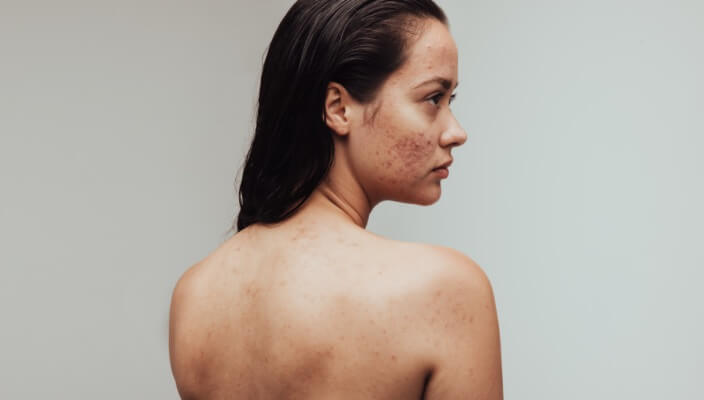
- General Dermatology
- Skin Care
When we think of acne, it’s often associated with teenage years and hormonal changes that come with puberty.
Read MoreFeatured Products for Acne
Check your local office for current stock!
Check your local office for current stock!


